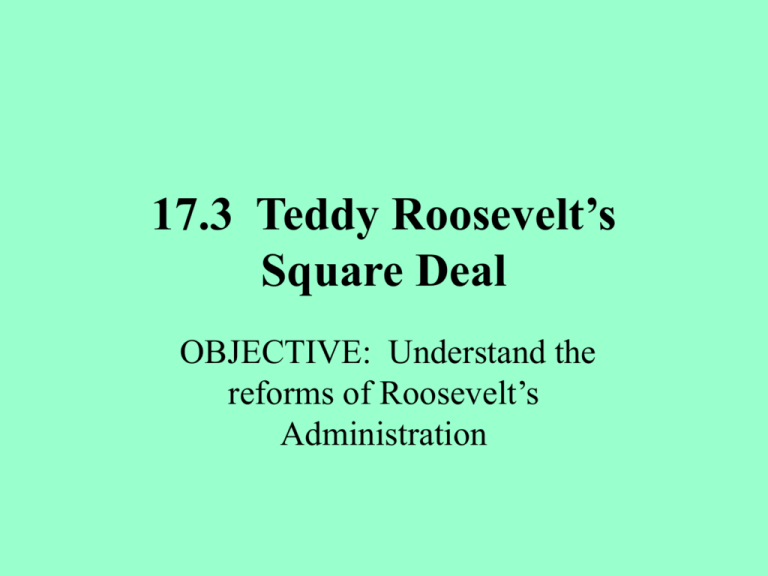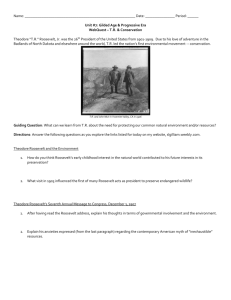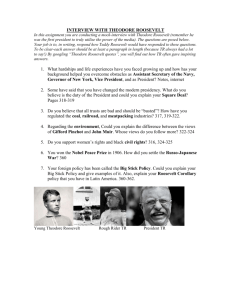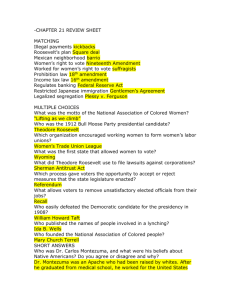
17.3 Teddy Roosevelt’s
Square Deal
OBJECTIVE: Understand the
reforms of Roosevelt’s
Administration
Identify and discuss four ways Pres. Roosevelt redefined federal power during his presidency
Establishes
Square Deal
1902 Coal Strike
Trust-busting
Railroad
Regulation
Theodore Roosevelt
• Governor of NY. Reformer. Hero of Spanish
American War.
• Nominated to be Vice-President by Republican
party bosses.
• 1901 Pres. McKinley assassinated, TR becomes
President.
• Creates the “modern presidency” b/c of his
popularity with the public and use of
media/press.
• Uses White House as a “bully pulpit”
Identify and discuss four ways Pres. Roosevelt
re-defined federal power during his presidency
• “Square Deal” = TR’s package of reforms
Expands the use of federal power to reform US
• Arbitrates the 1902 Coal Strike & threatened to assume
control of mines
HISTORICAL SIGNIFICANCE:
Govt. did not automatically back big business
• TRUST BUSTING – mixed record of success, perhaps because
TR sends a mixed message – considers some trusts good and other
bad.
• Railroad regulation – Elkins Act of 1903 and Hepburn Act of
1906 give the Interstate Commerce Commission more power to
curb the railroads power through federal regulation.
COMPARE AND CONTRAST
Pullman Strike
Anthracite
Coal Strike
of 1902
Identify and Discuss President Roosevelt’s
actions and policies in the areas of:
PROTECTING CITIZENS’
HEALTH
PROTECTING THE
ENVIRONMENT
POSITION ON CIVIL RIGHTS
TR and REFORM
PROTECTING HEALTH
1906: Meat Inspection Act:
(reaction to Upton Sinclair’s The Jungle)
1906: Pure Food and Drug Act
CONSERVATION
Created US Forest Service
Creates over 50 national parks & wilderness areas
CIVIL RIGHTS
Ambiguous record dealing with Civil Rights
– Hosted Booker T. Washington at White House,
– Yet, did not embrace reforms of NAACP
Theodore Roosevelt cartoon "A nauseating job, but it must be done"
Theodore Roosevelt cartoon "A nauseating job, but it must be done"
Upton Sinclair's novel, The Jungle, published in 1906, prompted President Theodore
Roosevelt to order an investigation of Sinclair's allegations about unsanitary
practices. Roosevelt then used the results of that investigation to pressure Congress
into approving new federal legislation to inspect meatpacking. (Utica Saturday
Globe)
Copyright © Houghton Mifflin Company. All rights reserved.
Theodore Roosevelt with John Muir at Yosemite, 1903
Theodore Roosevelt with John Muir at
Yosemite, 1903
In 1903, at Yosemite National Park,
Theodore Roosevelt met with John Muir,
a leading advocate for the preservation
of wilderness. While Roosevelt made
important contributions to the
preservation of parks and wildlife
refuges, he was more interested in the
careful management of national
resources, including federal lands.
(Yosemite Museum)
Copyright © Houghton Mifflin Company. All rights reserved.
Report of the National conservation commission. February, 1909. Special message from the
President of the United States transmitting a report of the National Conservation
commission, with accompanying papers ... Ed. under the direction of the Ex
SPECIAL MESSAGE OF THE PRESIDENT TRANSMITTING THE REPORT OF THE
NATIONAL CONSERVATION COMMISSION
The underlying principle of conservation has been described
as the application of common sense to common problems
for the common good. If the description is correct, then
conservation is the great fundamental basis for national
efficiency. In this stage of the world's history, to be fearless,
to be just, and to be efficient are the three great
requirements of national life. National efficiency is the
result of natural resources well handled, of freedom of
opportunity for every man, and of the inherent capacity,
trained ability, knowledge, and will, collectively and
individually, to use that opportunity.
TEST STUDY GUIDE
• 60 points = Matching and Multiple Choice
• 20 points = Map
• 20 points = Essay
– Identify factors in American Imperialism. Which was most
significant? Compare/Contrast WW and TR’s diplomacy
– Compare/Contrast arguments for and arguments against US
imperialism
– Compare/Contrast experiences of Cuba, Hawaii, Philippines and
Puerto Rico under US imperialism
– Describe & discuss the 4 major tenets of Progressivism
– Identify the key reforms and accomplishments of the Roosevelt
Administration




